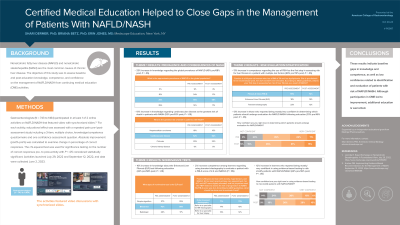Sunday Poster Session
Category: Liver
P0997 - Certified Medical Education Helped to Close Gaps in the Management of Patients With NAFLD/NASH
Sunday, October 22, 2023
3:30 PM - 7:00 PM PT
Location: Exhibit Hall

Has Audio

Shari Dermer, PhD
Medscape Education
Lititz, Pennsylvania
Presenting Author(s)
Briana Betz, PhD1, Erin Jones, BS1, Shari Dermer, PhD2
1Medscape Education, Newark, NJ; 2Medscape Education, Lititz, PA
Introduction: Nonalcoholic fatty liver disease (NAFLD) and nonalcoholic steatohepatitis (NASH) are the most common causes of chronic liver disease. The objective of this study was to assess baseline and post-education knowledge, competence, and confidence on the management of NAFLD/NASH from continuing medical education (CME) activities.
Methods: Gastroenterologists (N=743 to 1464) participated in at least 1 of 2 online activities on NAFLD/NASH that featured video with synchronized slides.[1,2] For each activity, educational effect was assessed with a repeated pairs pre-/post-assessment study including a 3-item, multiple choice, knowledge/competence questionnaire and one confidence assessment question. Absolute improvement (post%-pre%) was calculated to examine change in percentage of correct responses. The chi-squared test was used for significance testing on the number of correct responses pre- to post-activity with P < 0.05 considered statistically significant. Activities launched July 29, 2022 and September 12, 2022, and data were collected June 2, 2023.
Results: Prevalence and Consequences of NASH:
Risk Evaluation/Stratification:
Noninvasive Tests:
Discussion: These results indicate baseline gaps in knowledge and competence, as well as low confidence related to identification and evaluation of patients with risk of NAFLD/NASH. Although participation in CME led to improvement, additional education is warranted.
Disclosures:
Briana Betz, PhD1, Erin Jones, BS1, Shari Dermer, PhD2. P0997 - Certified Medical Education Helped to Close Gaps in the Management of Patients With NAFLD/NASH, ACG 2023 Annual Scientific Meeting Abstracts. Vancouver, BC, Canada: American College of Gastroenterology.
1Medscape Education, Newark, NJ; 2Medscape Education, Lititz, PA
Introduction: Nonalcoholic fatty liver disease (NAFLD) and nonalcoholic steatohepatitis (NASH) are the most common causes of chronic liver disease. The objective of this study was to assess baseline and post-education knowledge, competence, and confidence on the management of NAFLD/NASH from continuing medical education (CME) activities.
Methods: Gastroenterologists (N=743 to 1464) participated in at least 1 of 2 online activities on NAFLD/NASH that featured video with synchronized slides.[1,2] For each activity, educational effect was assessed with a repeated pairs pre-/post-assessment study including a 3-item, multiple choice, knowledge/competence questionnaire and one confidence assessment question. Absolute improvement (post%-pre%) was calculated to examine change in percentage of correct responses. The chi-squared test was used for significance testing on the number of correct responses pre- to post-activity with P < 0.05 considered statistically significant. Activities launched July 29, 2022 and September 12, 2022, and data were collected June 2, 2023.
Results: Prevalence and Consequences of NASH:
- 23% increase in knowledge regarding the global prevalence of NAFLD (45% pre/68% post; P < .05)
- 10% increase in knowledge regarding cardiovascular disease as the greatest risk of death in patients with NASH (52% pre/62% post; P < .05)
Risk Evaluation/Stratification:
- 13% increase in competence regarding the use of FIB-4 as the first step in assessing risk for liver fibrosis in a patient with multiple risk factors (59% pre/72% post; P < .05)
- 13% increase in those who reported being mostly/very confident in determining which patients should undergo evaluation for NAFLD/NASH following education (33% pre/46% post; P < .05)
Noninvasive Tests:
- 16% increase in knowledge about the Enhanced Liver Fibrosis (ELF) test following education (42% pre/58% post; P < .05)
- < 2% increase competence among learners regarding using transient elastrography to evaluate a patient with a FIB-4 score of 2.2 and NAFLD (P = NS)
- 12% increase in learners who reported being mostly/very confident in using evidence-based testing to risk stratify patients with NAFLD/NASH (24% pre/36% post; P < .05)
Discussion: These results indicate baseline gaps in knowledge and competence, as well as low confidence related to identification and evaluation of patients with risk of NAFLD/NASH. Although participation in CME led to improvement, additional education is warranted.
Disclosures:
Briana Betz indicated no relevant financial relationships.
Erin Jones indicated no relevant financial relationships.
Shari Dermer indicated no relevant financial relationships.
Briana Betz, PhD1, Erin Jones, BS1, Shari Dermer, PhD2. P0997 - Certified Medical Education Helped to Close Gaps in the Management of Patients With NAFLD/NASH, ACG 2023 Annual Scientific Meeting Abstracts. Vancouver, BC, Canada: American College of Gastroenterology.
